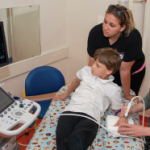Recent research shows bimekizumab may improve patient-reported outcomes and quality of life for ankylosing spondylitis (AS) patients…


Recent research shows bimekizumab may improve patient-reported outcomes and quality of life for ankylosing spondylitis (AS) patients…
Corrections to reimbursement system errors with Aetna and a Medicare contractor demonstrate the latest wins for all providers by the ACR’s Insurance Subcommittee. But the committee remains hard at work advocating for rheumatologists on several fronts.
This year, the Annual Meeting Planning Committee has designed an engaging program, bringing together the best experts to address important topics. Here’s a sneak peek at what’s new…

Rheumatologists, behavioral specialists, pharmacists and other healthcare professionals are working in the Autoimmunity Institute at Allegheny Health Network, Pittsburgh, to care for the whole patient…
Join us in Atlanta Nov. 8–13 for the 2019 ACR/ARP Annual Meeting. Member registration is now open, including registration for the annual pre-meeting practice management workshop: Practice Matters—Navigating a Path to Success! (General registration opens June 26.) The 2019 workshop will focus on key practice matters. The goal of the pre-meeting workshop is to address…

Some would call Guillermo J. Valenzuela, MD, a hunter of sorts. He has accompanied men and their dogs into the forests of Italy in search of white truffles, an underground fungus considered a European delicacy. “Years ago, when visiting my wife’s family in Italy, I walked into a very old restaurant in Parma,” says Dr….

Heather Benham, DNP, RN, CPNP, RhMSUS, on behalf of the ARP Practice Committee |
I have worked as an advanced practice provider (APP) in pediatric rheumatology for nearly 16 years. My collaborating physicians have allowed me to function to the full extent of my scope of practice while allowing me to develop professionally within the subspecialty. My latest endeavor has been learning how to perform musculoskeletal ultrasound (MSUS) and…

Larry Beresford |
SAN FRANCISCO—The challenges of trying to solve the puzzle of lupus, in light of its broad heterogeneity of symptoms, manifestations in clinical involvement and treatment response, and the sheer complexities of the immune system, are driving researchers into ever more elaborate investigations of how the immune system functions in lupus patients. Genetic, transcriptomic and epigenetic…

Larry Beresford |
A recent analysis of retrospective clinical data on patients with systemic lupus erythematosus (SLE) at 14 Canadian centers found that a surprisingly high proportion—at least one-third—had active disease at any point over five years of data collection.1 It has been a longstanding belief among clinicians that SLE becomes less active over time, although its accumulation…

Kim Steinbarger, PT, MHS, knows how physical and occupational therapy can make a difference for patients with rheumatic diseases. Ms. Steinbarger was just two years into her career as a physical therapist (PT) when she was diagnosed with rheumatoid arthritis (RA) in 1991. “I’ve seen how regular exercise serves as an important tool in managing…